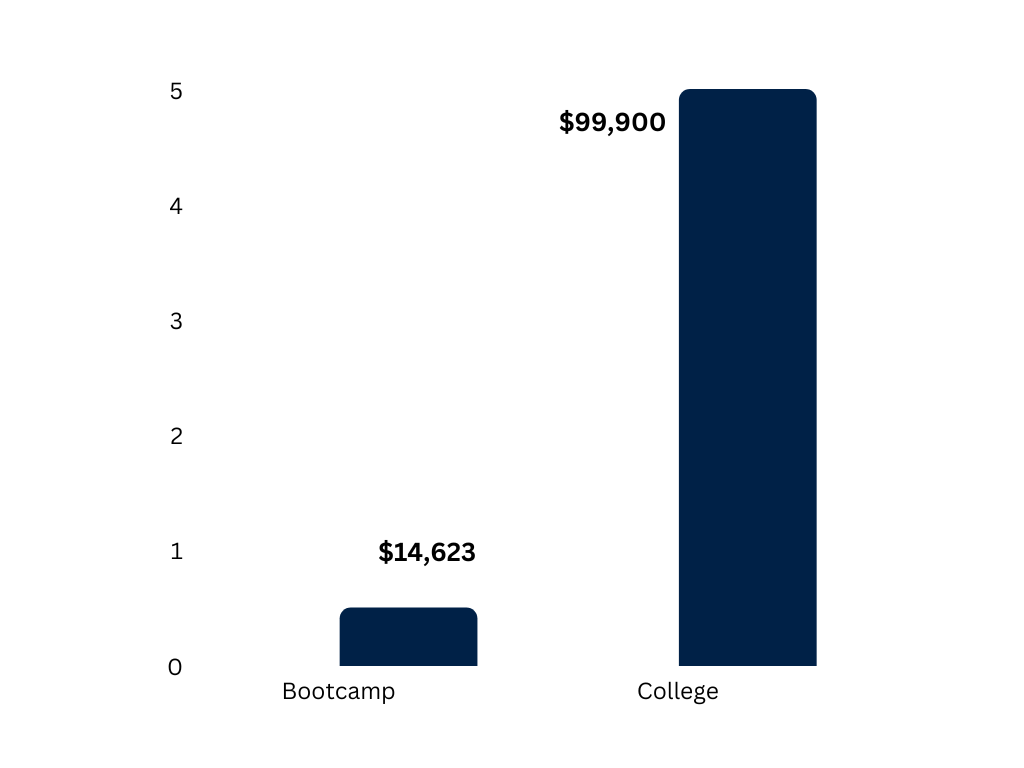- Home
- Courses
- Full Time Courses
- Becoming Full Stack Developer (.NET)
- Fundamentals Of Cloud Computing (Azure)
- Introduction To CI/CD Pipelines
- Software Engineering Immersive (SEI)
- Introduction To Flutter App Development
- JavaScript Development
- SOC Analyst Cyber Security Intrusion Training
- Full Web Ethical Hacking Course (Master course)
- CompTIA Security+ Course
- Front-End Web Development
- Graphic Designing
- UI UX Designer
- Becoming Full Stack Developer (.NET)
- Part Time Courses
Full Time Courses
Part Time Courses
- Full Time Courses
- About Us
- Blogs
- Contact Us
Which is better for landing top tech jobs: bootcamps or college?

According to a report by Course Report, the average cost of a bootcamp in the US is around $13,293 for in-person programs and $8,766 for online programs. On the other hand, the average cost of a four-year computer science degree at a public university is around $39,880, and at a private university, it is around $155,090.
The technology industry has experienced unprecedented growth in recent years, resulting in a significant demand for skilled workers. Consequently, many people are trying to break into this field and advance their careers. But the question is, which is better for getting top tech jobs: going to a coding bootcamp or college the old-fashioned way?
Bootcamps: An Overview
Over the past ten years, coding bootcamps have gained popularity due to their intensive, immersive programs that teach students the technical skills they need to find employment in the tech sector. Bootcamps concentrate on practical coding skills that align with current industry trends and are typically shorter than traditional degree programs. Additionally, they give students a chance to gain knowledge from experts in the field, compile a body of work, and get help with job placement.
College Degrees: An Overview
Traditional college degrees, on the other hand, offer a broader education that goes beyond technology and covers subjects like math, science, and writing. A bachelor’s or associate’s degree typically takes four to six years to complete in a college program. For those looking for advanced technical roles, college degrees provide a more thorough understanding of computer science’s theoretical and fundamental principles.
Which is better for landing top tech jobs?
The answer to this question is not simple because it depends on a number of variables, such as personal preferences, situational factors, and career aspirations.
Bootcamps are frequently a great option for people who want to learn more quickly and with more focus, as well as for those who want to change careers soon. In addition to helping students gain valuable networking experience, bootcamps can also help them build relationships within the industry and possibly find a job more quickly.
The decision to enrol in a bootcamp or college will ultimately be based on your personal situation, professional goals, and preferred learning style. Both options have benefits and drawbacks, so it is up to you to choose the one that is right for you.
Will inflation have any impact on the employment rates of bootcamps?
Inflation can have different effects on the job market, and it may potentially impact the employment rates of bootcamp graduates. If the cost of living increases significantly, employers might be less inclined to hire new employees or raise salaries, resulting in a decline in hiring. However, it’s important to note that the tech industry is often less impacted by economic fluctuations, and there remains a high demand for skilled workers in the field. Moreover, bootcamps typically focus on teaching practical and in-demand skills, making their graduates more attractive to employers regardless of economic conditions. In the end, the effect of inflation on employment rates will depend on several factors, and it’s difficult to predict how it will impact the job market for bootcamp graduates specifically.
Bootcamps vs. Colleges Fees
It’s essential to understand that this comparison doesn’t only apply to people with bootcamp training but no bachelor’s degree. Bootcamps are used by people with a variety of educational backgrounds and levels of experience to break into the tech industry, change careers, or pick up new skills for their current position.
This comparison is especially helpful if you’re thinking about returning to school and considering a Bootcamp or a bachelor’s degree in computer science. However, a bachelor’s degree is not always necessary for employment with major tech companies; over half of tech executives, including those at Google and Apple, say they will hire candidates without a degree.

